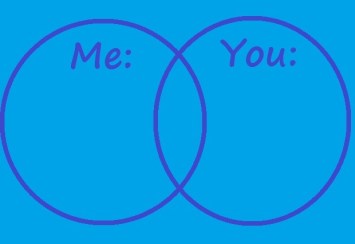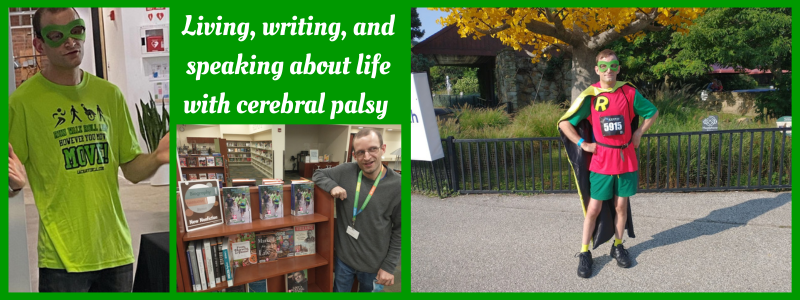This post includes Amazon affiliate links to my cerebral palsy memoir Off Balanced. As an Amazon affiliate I earn a commission on qualifying purchases.
Spend enough time in the cerebral palsy (CP) community and you will come to learn and maybe even actually hear the phrase. “If you know one person with cerebral palsy, then you know ONE person with cerebral palsy.”
Admittedly the CP community does not hold exclusivity over that lesson. Personally I heard the same principle applied to the autism community, also most recently the Down syndrome population. In fact the latter occurred during a phone interview for Think Inclusive I conducted with Zeno Mountain Farm co-founder Will Halby. You can read Will’s exact comments below.
“I know probably 500 people who have been diagnosed with Down syndrome and they are all very different from each other. They’re more different from each other then most of me and my friends who don’t have Down syndrome.”
The comments really appeal to what Zeno Mountain Farm values, friendship. For those unfamiliar with Zeno Mountain Farm, you could learn more at their website zenomountainfarm.org.
Reflecting on my own work as an advocate I notice contradiction. In efforts to create cerebral palsy awareness I’m quick to point out how CP differs person to person, like I do in my video “If Hulk Hogan had cerebral palsy…”
Meanwhile my memoir Off Balanced I’m targeting commonalities. I tell my story hoping to provide comfort to those going through similar situations. Yet amidst commonalities emerges differences. Enter into evidence my connection with fellow cerebral palsy advocate Mike Berkson.
Both Mike and I find commonality and acceptance through shared interests. The difference surfaces with the shared interest itself. Mike uses movies and I Cleveland Indians baseball.
 So perhaps instead of viewing my work as contradicting, I’m actually uncovering a bigger truth. If you know one person, you know one person. We all possess similarities and differences. Certain feedback to Off Balanced comes to my mind. A reader who battled depression in high school contacted me and shared how despite our different situations he related to my experiences. He found similarities.
So perhaps instead of viewing my work as contradicting, I’m actually uncovering a bigger truth. If you know one person, you know one person. We all possess similarities and differences. Certain feedback to Off Balanced comes to my mind. A reader who battled depression in high school contacted me and shared how despite our different situations he related to my experiences. He found similarities.
Similarities and differences go beyond cerebral palsy. Similarities and differences go beyond autism. Similarities and differences go beyond Down syndrome. Heck, similarities and differences go beyond disability. A bookworm or a redhead for instance might connect to the self-consciousness I document in Off Balanced because ultimately similarities and differences remain engrained in human nature.
Want to explore our similarities and differences? Read Off Balanced (available at Amazon). After reading, contact me and let me know what you related to and in which ways your experiences proved different. I look forward to your feedback! Bonus points to anyone who uses the above Venn diagram.




Heh, if I had a dollar for every time someone told me “I knew someone who was deaf” and dived into further details, I think I might have more money than my mistaken identity twin.
It is true about the diversity of people, especially those with similar human conditions. Even within the deaf and hard of hearing community where there are certain attitudes that rings a bell with your comment regarding “ONE” person.
In the end, this topic reminded me of a Twitter conversation I had with another deaf person about labels. It was a passionate topic for that person and he asked me what I thought about labels. I responded that I understood the need for labels to a point.
In the end, we do need labels to a point to achieve something. But to take labels further to create a particular mindset that eventually becomes a stereotype is beyond the “point”.
I admit it took me a long time to cross back to this side of the point so I could define my personal focus in life. I took a quick gander at your interview with Zeno Mountain Farm and while another can of worms was opened when I read the comment about how even inclusive is exclusive.
That’s exactly what I mean by a point. I wish I had a specific answer to sum up my rambling but great topic. You have given me something to chew on for a while.
Looking forward to reading the rest of your posts. (Just arrived today after meeting you on Twitter the other day.)
Thanks for the comment Mark. I’m glad we met through Twitter. Zeno Mountain Farm’s Will Halby has been one of my most memorable interviews. He possesses a lot of interesting insights.